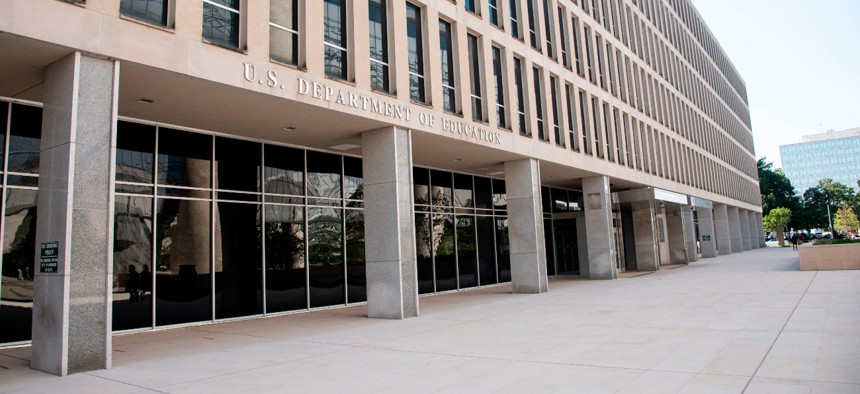
The new policy deleted contract provisions governing telework, child and elder care, among other things. Robert Knopes/Getty Images
Education Dept. and AFGE Reach a Settlement on Dozens of Complaints Stemming From 2018 Management Edict
A draconian collective bargaining agreement imposed without negotiating with the union, ended official time, removed workplace protections and implemented a scheme designed to cut off the union's dues collection.
The nation’s largest federal employee union last week announced that it had reached a settlement with the Education Department to resolve dozens of unfair labor practice complaints, arbitrated grievances and other litigation stemming from the department’s 2018 unilateral imposition of a draconian new contract.
Under then-Secretary Betsy Devos, the Education Department in 2018 broke off ground rules negotiations for bargaining a new contract and told the American Federation of Government Employees that it would devise its own collective bargaining agreement. In March 2018, the department released the edict and implemented it over the objections of the union.
The new policy deleted contract provisions governing telework, child and elder care, guidelines for promotions, step increases and bonuses and protections for employees with disabilities. It also essentially banned the union from accessing official time, evicted labor leaders from department-provided office space, as well as a scheme to upend the process for deducting union dues from employees’ paychecks.
Under the management edict, the department required employees to reaffirm their union membership on an annual basis, although it failed to inform employees when that action was required. As a result, the department cancelled dues withholding for 600 employees without informing them of the change.
AFGE Deputy General Counsel Cathie McQuiston the union’s national office essentially had to step in and perform the duties traditionally handled by local union presidents and stewards, both because of the lack of official time and the need to inform members how to ensure their dues continue to be collected on a yearly basis.
“This was so much more extreme than [President] Trump’s anti-union executive orders, it was a clear union bust,” McQuiston said. “There was no official time, no bargaining over anything, we were kicked out of our offices, and then they took our financial resources by dropping our members unilaterally. As you know, dues are our only source of income, so this was clear and calculated. There’s no clearer example in the federal government of union busting.”
Over the next three years, the union ultimately filed 14 unfair labor practice complaints, 10 grievances that went to arbitration, along with other forms of litigation. President Biden’s inauguration in 2021 led to nearly two years of negotiations, culminating in last week’s settlement, which establishes a new interim collective bargaining agreement—effectively a modified version of the department and union’s 2013 contract—that parties may renegotiate in May 2023, if they so choose.
The settlement restores official time, returns the union to its previously occupied office space, restores dues deductions for the around 600 employees who were removed from the rolls without their consent and pays the union for dues the department should have deducted. The department will also provide some backpay for union officials who were required to take leave without pay in order to perform representational duties traditionally covered by official time, as well as pay nearly $200,000 in attorneys’ fees.
McQuiston said that there could have been more pieces of litigation against the department, but the department’s edict effectively intimidated employees into not pursuing them.
“It was all about making sure there was nobody there to help you and then dropping you off of your dues payments,” she said. “We could have twice as many ULPs during that time frame, but it was hard to get people to come forward, because they have to give sworn statements, and people were too scared. There was a big fear factor, and we had to work really hard to overcome that. Nobody wanted to talk to the union, because they saw how the union representatives suffered.”
Once Biden took office, McQuiston said the department mostly abandoned its anti-labor tactics. But the negotiations over a settlement agreement dragged on at least in part because the department’s labor relations staff involved in the discussions were the same ones who implemented the illegal contract in the first place.
“I think undoing the broader Trump stuff, when you have new people come in, they don’t own or weren’t involved in the Trump-era conduct, so it’s not as big a struggle usually, because it’s not their reputation,” she said. “But when you have someone who was pitching this and carrying it out, and they have to do a 180, they don’t want to. They’re management—they want to save face . . . It was really challenging to get there. It took pressure from OPM and from the press and from the White House.”







